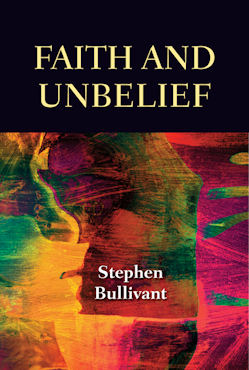
|
Posted June 16, 2014
Book: Faith and Unbelief Author: Stephen Bullivant Paulist Press, Mahwah, NJ. 2014. Pp. 156 An Excerpt from the Introduction:
To come back to where we started this introduction: St. Paul's remark on the Ephesians' erstwhile atheos-ity [atheism] might have little, directly at least, to contribute to a Christian theology of contemporary unbelief. And yet he would, I think, recognize the need for today's Christians to think about and engage with this most striking sign of the times --- and to do so humbly, striving sincerely to understand the reasons for and realities of modern atheism, while remaining faithful to those truths and the 'good news' to which Christianity bears witness. This is a small attempt to do just that. An Excerpt from the Book: Socrates and the Queen of Sheba Though we're interested here in atheists, it is nonetheless true that much of what comes under this topic applies equally to the salvation of non-Christians in general. That is not true of every point: as we shall see, the possibility of salvation for atheists raises particular questions that do not occur when considering the salvation of non-Christian theists (and vice versa). Nevertheless, there is a good degree of overlap, especially on some of the biggest and most foundational issues. In general terms, therefore, it will be salutary to note that the Christian Scriptures and tradition recognize not merely that a great many non-Christians are (or will be) saved, but moreover that a good number of them are even bona fide saints. The most obvious category of these is the 'holy ones' of the Old Testament. Jesus states categorically that 'many will come from east and west and will eat with Abraham and Isaac and Jacob in the kingdom of heaven, and Moses and Elijah appear at his Transfiguration in all three of the Synoptic Gospels. Crucially, the Old Testament saints include Gentiles as well as Jews. Jesus himself affirms that the Queen of Sheba will be one of the judges in the last days, along with the people of Nineveh, and the Christian tradition has long accorded saintly status to, among others, Abel, Enoch, Noah and Job, all of whom lived either before, or otherwise outside of, both the Old and New covenants. In the early patristic period, moreover, other candidates were sometimes proffered even from beyond the bounds of the Old Testament. Our second century friend Justin Martyr, for instance, was convinced that prior to the incarnation the Word was active within 'every race of men', and that everyone among them who lived 'reasonably' (or 'according to the Word') was a kind of proto-Christian. He specifically mentions here those who 'have been thought atheists (atheoi); as, among the Greeks, Socrates and Heraclitus, and men like them', while also remarking that there were 'many others' that recounting them all would be 'tedious'. Elsewhere, and interestingly, it is clear that Justin includes among such people 'not only philosophers and scholars . . . . but also artisans and people entirely uneducated, despising both glory, and fear and death. Admittedly, Justin's sanguineness has not been universally affirmed either by other early Fathers or by later theologians. That said, he is by no means a lone voice crying in the wilderness either. On the eve of the Reformation, for example, Erasmus could, happily write St. Socrates, pray for us!, and 'perhaps the Spirit of Christ is more widespread than we understand and the company of saints includes many not in our calendar'. Table of Contents: 1. The 'atheism' of Christianity 2. Reasons to disbelieve 3. 'Is it not our own fault?' 4. Can atheists be saved? 5. Dialogue with unbelievers 6. New evangelization? |
|
